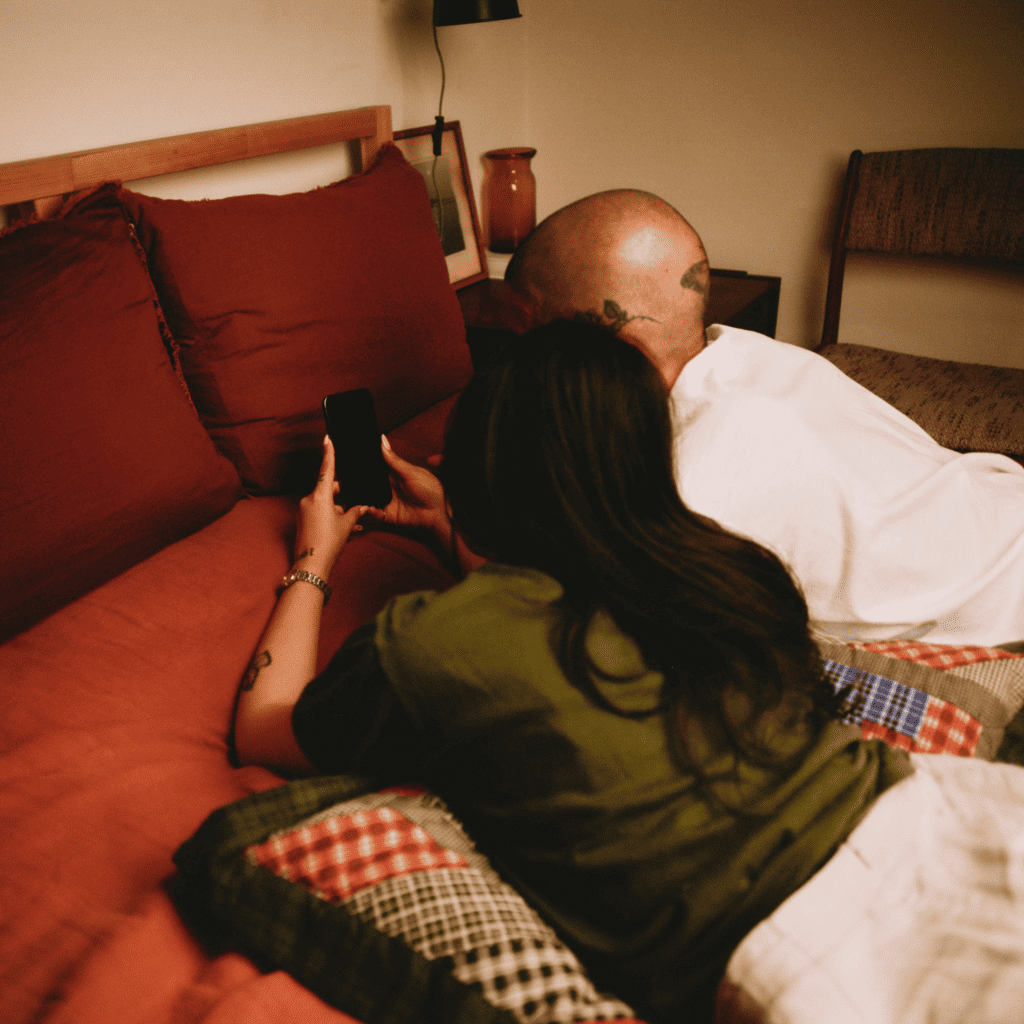Relationship wellness
Balancing work and relationships a challenge for 74% of people

contents
Work is hard, but so are relationships. Our data shows that stresses at work and relationships often bleed into others, further strengthening the need for a healthy work-life balance.
It’s late afternoon on a Friday. You have a hard deadline for an important work project, but it’s also a long-overdue date night with your significant other. Do you tell your boss you need another day on the project and go on that date? Or do you cancel your date so you can get caught up? For many people balancing work and family, these decisions are a significant source of stress.
We surveyed 1,000 people to learn more about the connection between work and romantic relationships. Read on to discover why balancing work and relationships is important for success in both areas of your life.
Key findings:
- 74% of people believe succeeding at work and family is challenging.
- 76% feel their employers support their efforts to balance work and relationships.
- 63% of married people wish their employer offered relationship benefits such as couples counseling.
- 73% report feeling happier at work when they are in a healthy relationship.
- 94% of finance professionals report struggling to focus at work when they’re in conflict with their partner.
- 33% of engaged couples report work puts a strain on their relationship.
- Younger professionals are more likely to consider leaving a job that strains their relationship.
- Half of single people report their career makes it difficult to find a partner.
- Nearly a third of divorced people report work played a role in their divorce.
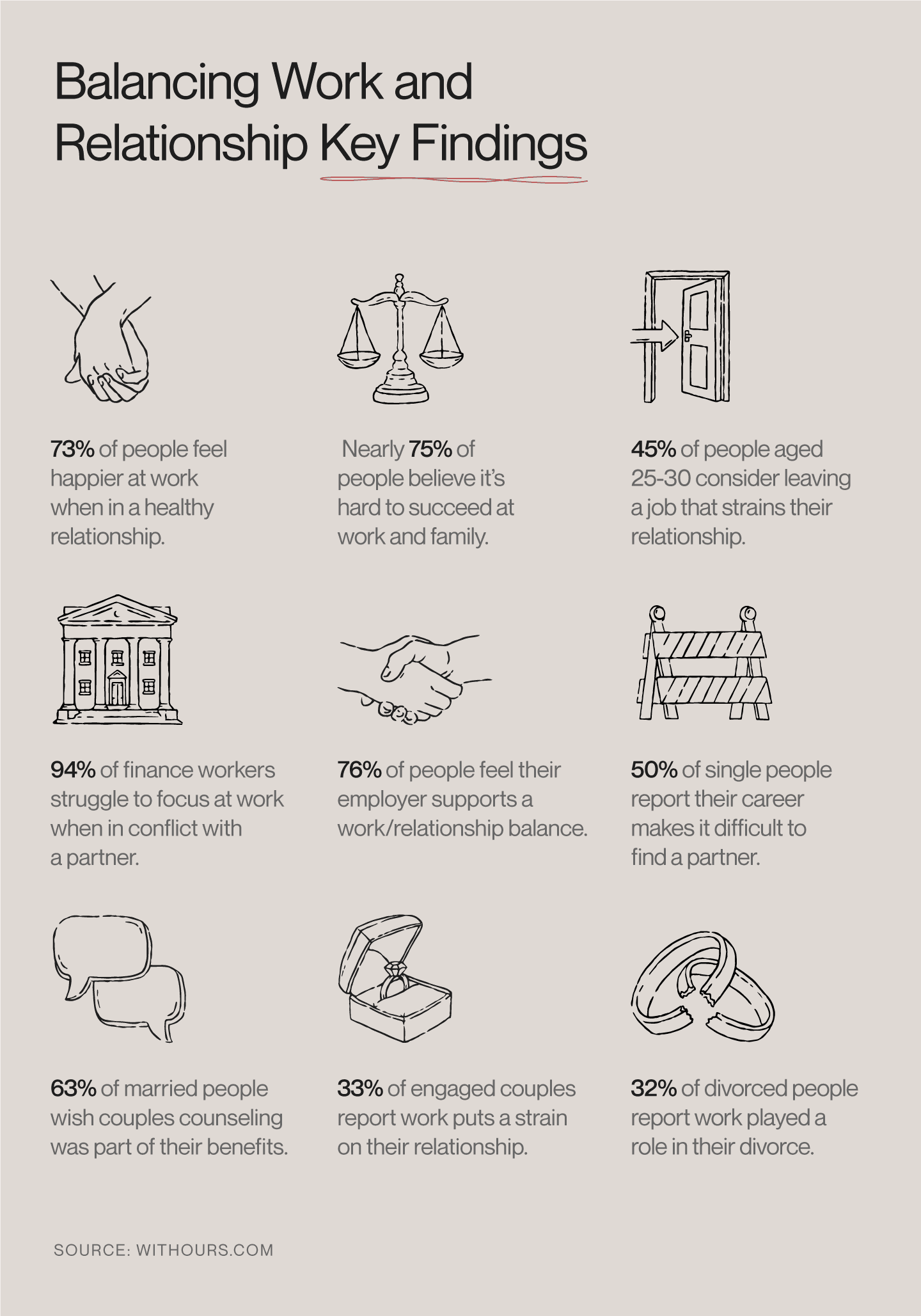
Table of contents:
- Success at work and relationships
- Employer support for balancing work and relationships
- Lack of couples counseling benefits
- Happiness in relationships and at work go hand-in-hand
- Healthy relationships mean better work performance
- Conflict with a partner impacts work performance
- Impact of work on engagements
- Who considers leaving a job that is harmful to relationships
- Careers can make it hard to find a partner
- Work plays a role in divorce
- 5 Tips for balancing work and relationships
Almost 75% of people believe it’s difficult to find success at work and relationships simultaneously
T Nearly 40% of respondents strongly agree that balancing work and relationships is challenging, suggesting that work can significantly stress a relationship and vice versa.
Being successful at work requires you to satisfy all of your employer’s expectations and be a team player, which may require you to stay late to meet deadlines. This is especially true if you want to advance your career, in which case you need to go above and beyond what your boss expects of you.
Relationships also require work: communication, quality time, respect, and trust take time to develop and maintain. Being in love involves intimacy and vulnerability to create a long-lasting, meaningful relationship, and couples must consistently cultivate both. The work differs from what you put into your career but is no less important if you want to maintain a healthy relationship.
Rarely, if ever, will you find a perfect 50-50 split between work and relationships. Sometimes, your relationship must take priority over your job, and vice versa. Because this balance shifts constantly, it can be challenging to work through, creating conflict at home or at work and causing stress.
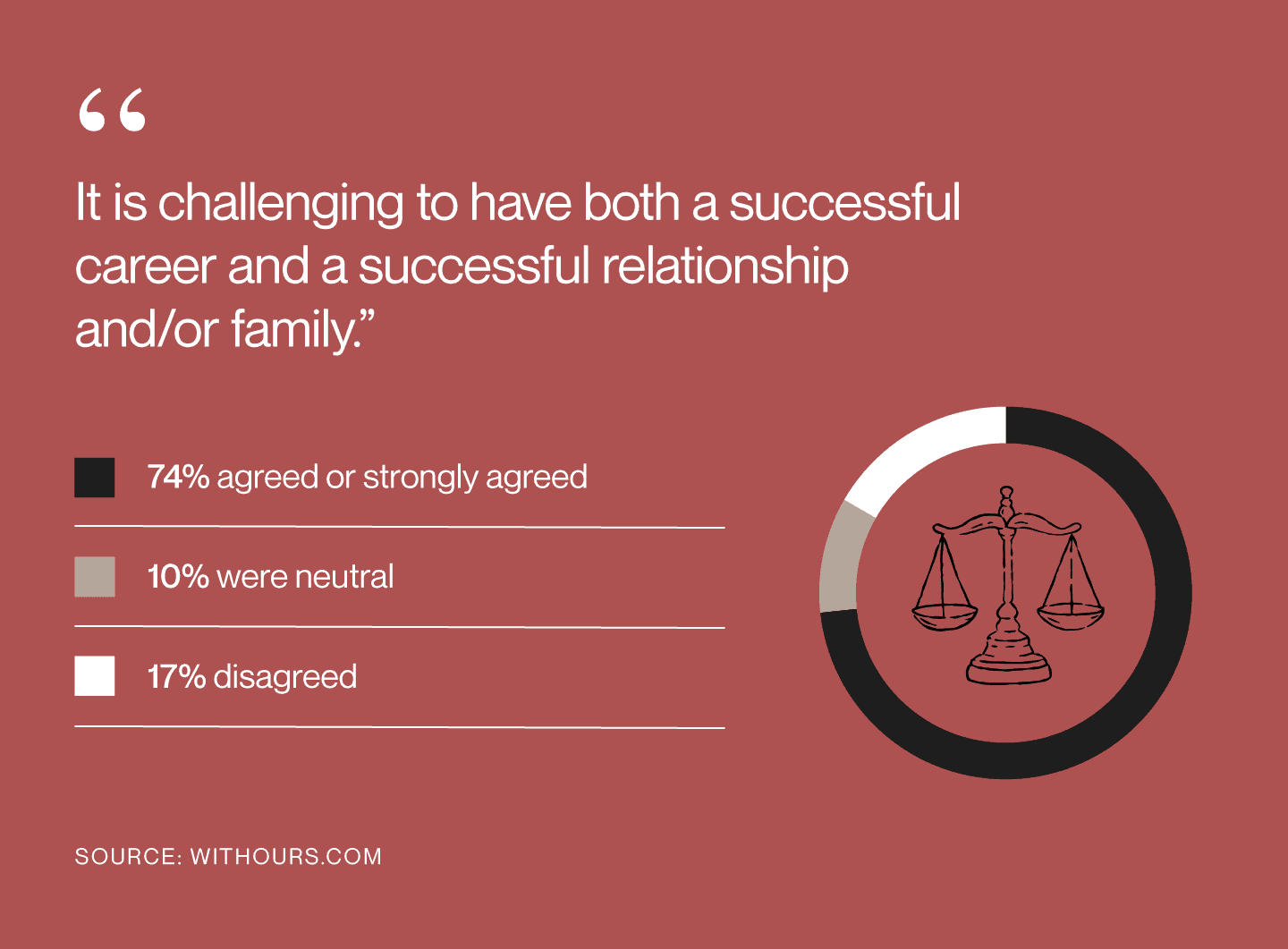
Majority feel their employer supports work and relationship balance
Fortunately, most respondents (76%) reported that their employers supported them in balancing work and relationships no matter what their relationship status was. Feelings of support were consistent across various factors, suggesting that employer support for a healthy work-life balance is more prevalent than previously thought.
A few data highlights from our survey:
- People aged 25-30 reported feeling supported by their employer more than any other age range at 81%.
- Not surprisingly, self-employed individuals felt the most supported.
- People who work less than 40 hours a week felt slightly more supported (78%) than those who work 40+ hours a week (74%).
- Those working in education (63%), retail sales (60%), and utilities/energy (56%) feel the least supported.
- The highest rates of support were reported by people working in finance (91%), food and beverage (88%), and hotel/hospitality (86%).
- Presidents and partners reported the most support (94%), while associate/junior employees reported the least (70%).
63% of married couples wish employers offered couples counseling benefits
Nearly two-thirds of people married or in a long-term committed relationship wish their employer offered relationship benefits such as couples counseling or other resources on balancing work and relationships. Since so many people struggle to find balance, they are looking for tools and support to better manage their relationships and work commitments.
Unfortunately, insurance often doesn’t cover couples therapy because it isn’t classified under a specific medical diagnosis like other types of counseling. For this reason, 55% of people report cost as the most significant barrier to getting couples counseling.
However, you may be able to get your couples therapy covered with marriage counseling add-ons — your insurance provider can help you find options. Some insurance plans may cover some types of couples therapy if you or your partner has a diagnosed mental disorder, and the counseling would be part of that person’s treatment.
Your employer may cover couples counseling.
73% of people are happier at work when they’re happier in their relationship
Happiness in a relationship can impact a person’s happiness at work.
Most people, including people who currently identify as single, agree that they are happier at work when they are in a happy, healthy relationship. This is especially true for people who are casually dating (87%), widowed (85%), or married/in a long-term committed relationship (82%).
The correlation between happiness in relationships and happiness at work increases the higher your annual income before leveling off after crossing the $150,000 threshold:
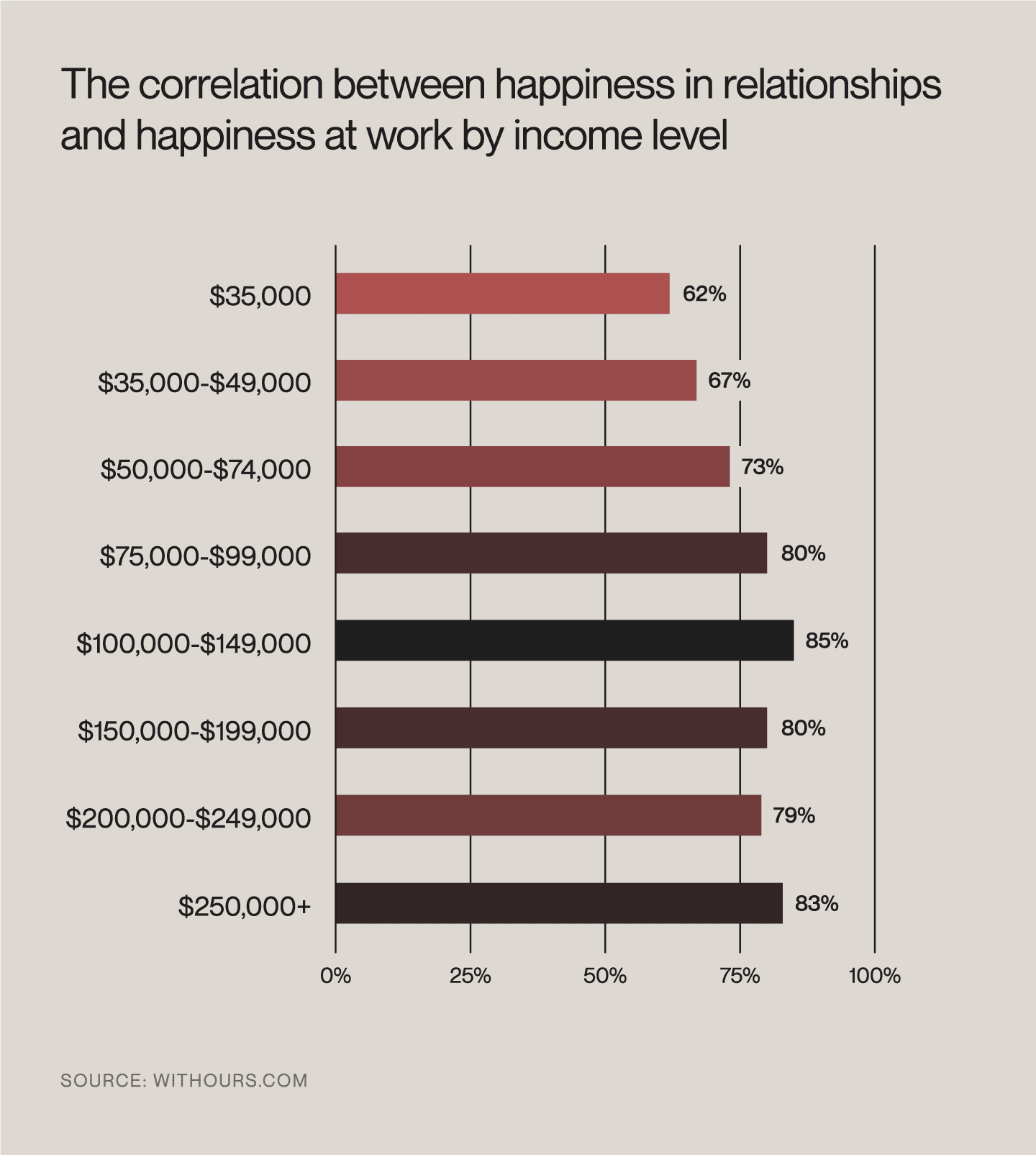
This suggests a correlation between the positive impact of a healthy relationship and income. This could be because people with lower incomes have more pressing needs that may impact their happiness at work.
Surprisingly, men (79%) report this statement as true much more than women (68%). This contradicts the age-old misconception that women are more emotional and more likely to bring their personal lives to work.
Healthy relationships boost work performance
Since people report being happier at work when they are in a healthy relationship, it’s not surprising that most people (76%) also report they perform better at work when in a healthy relationship.
This suggests that supporting employees in their efforts to balance work and relationships shouldn’t be an afterthought for employers — it’s not a feel-good perk but a way to improve productivity and performance, ultimately improving the company’s bottom line.
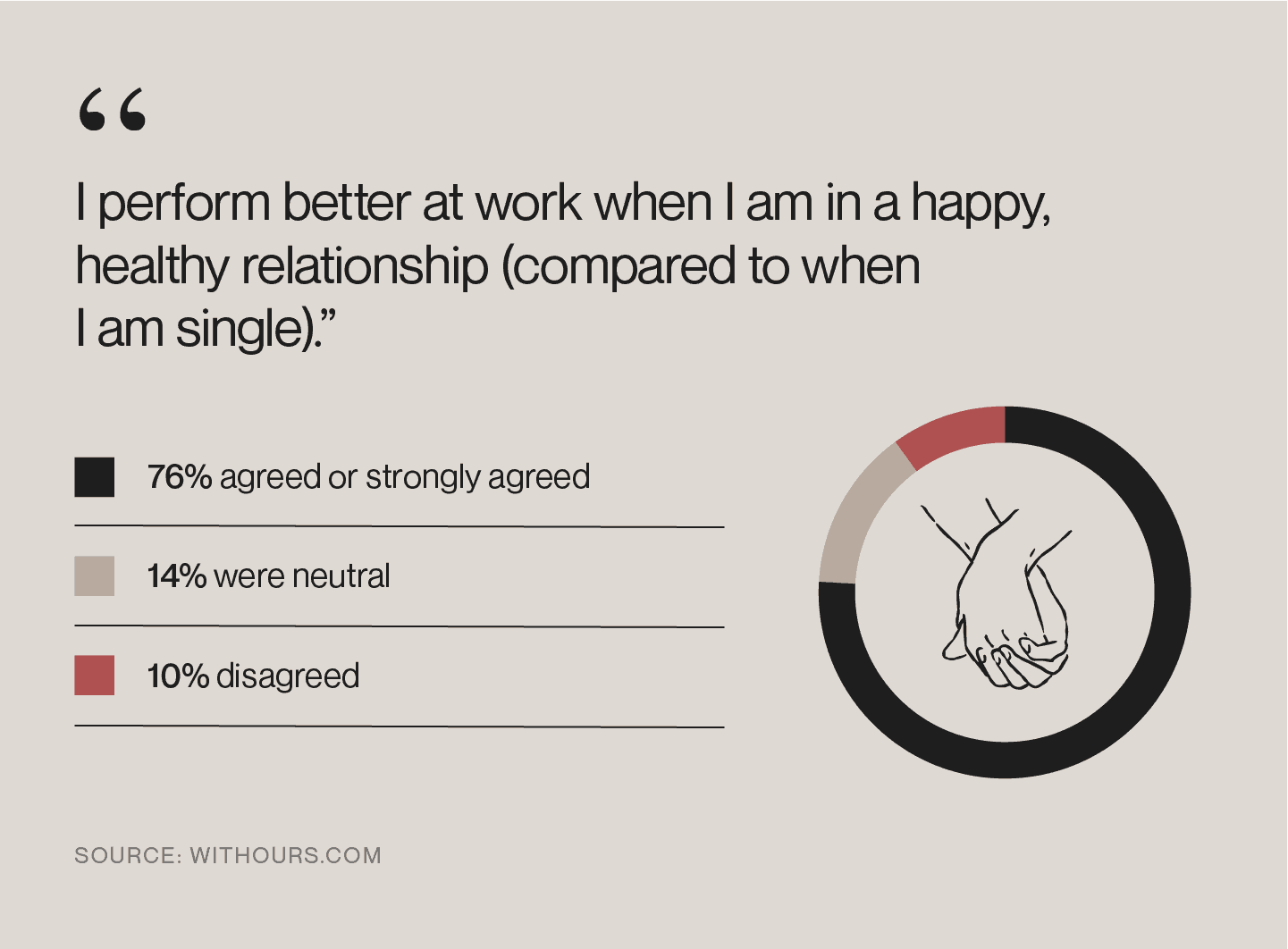
80% can’t focus at work when in conflict with a partner
Employers have a good reason to help their employees find a strong work-life balance: conflict at home can impact an employee’s ability to focus at work, especially in technical careers.
This sentiment is true across all industries:
- Banking and finance: 94%
- Information services/data processing: 93%
- Education: 88%
- Healthcare: 81%
- Professional services: 81%
- Hotel/hospitality: 81%
- Other: 77%
- Manufacturing: 75%
- Military: 75%
- Food and beverage: 71%
- Utilities/energy: 67%
- Retail sales: 64%
- Entertainment media/publishing: 60%
33% of engaged couples say work causes a strain on their relationship
Nearly 4 in 10 respondents in a relationship believe that work is a source of strain. While this isn’t as much of a problem for people dating seriously, it is for engaged couples, with one-third of engaged respondents stating work strains their relationship.
“Today, as more individuals embrace dual careers, couples are finding themselves navigating relationships built around two careers rather than one,” Benu Lahiry, LMFT, says. “With many individuals prioritizing personal and career growth before marriage, the integration of these busy professional lives can inevitably strain and challenge their relationship dynamics.”
Addressing these issues in pre-marriage counseling is essential to avoid them becoming a larger problem later in the relationship. This type of couples counseling involves learning how to navigate conflict and building a solid foundation for a successful marriage.
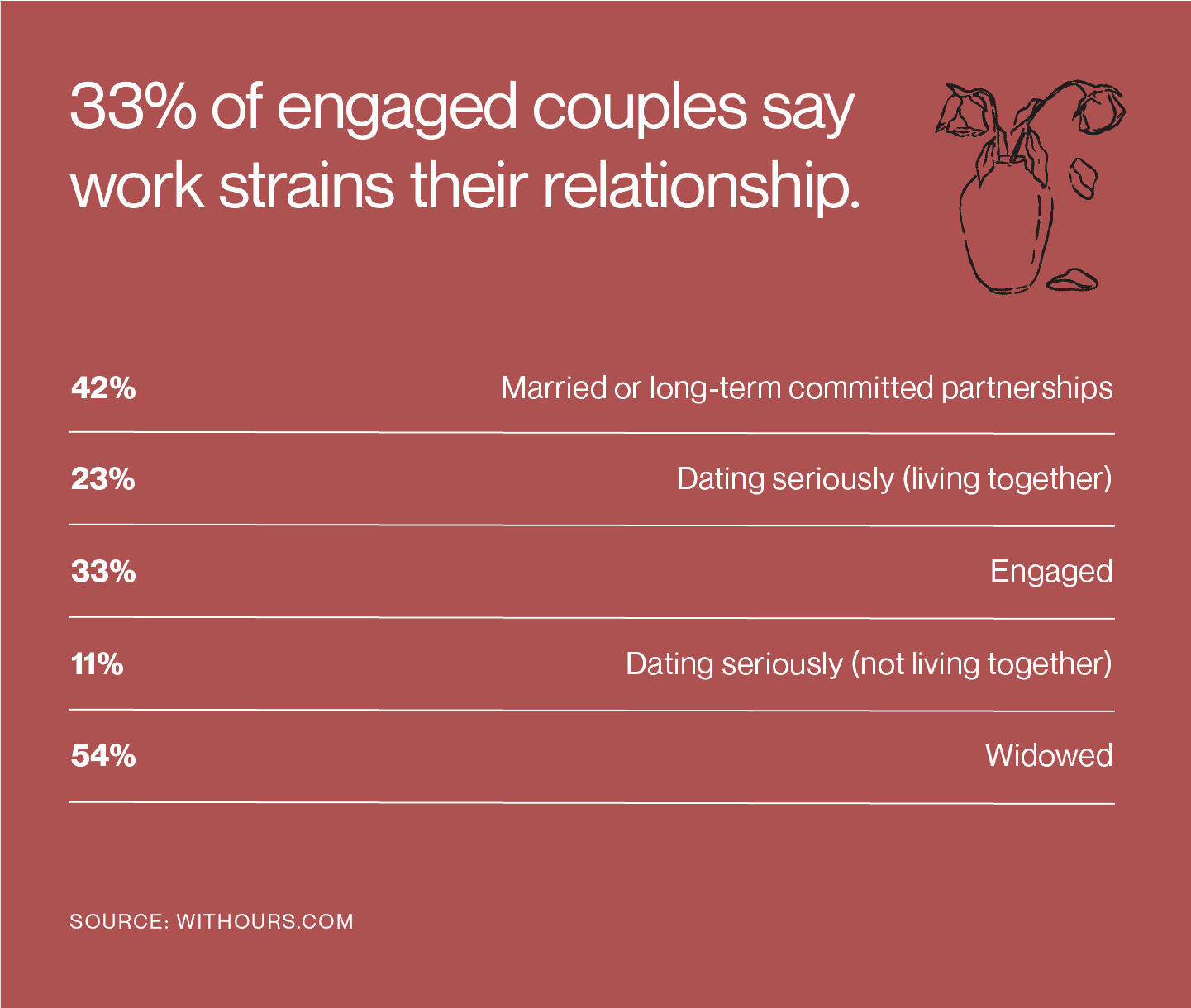
Younger people are more likely to consider leaving a job if it’s harming their relationship
Nearly half of people aged 25-30 have considered leaving a job that was harming their relationship, compared to only a quarter of people aged 51-60. Data shows the percentage for the oldest ages in the survey is disproportionate to all other age groups:
- Ages 25-30: 45%
- Ages 31-40: 50%
- Ages 41-50: 44%
- Ages 51-60: 25%
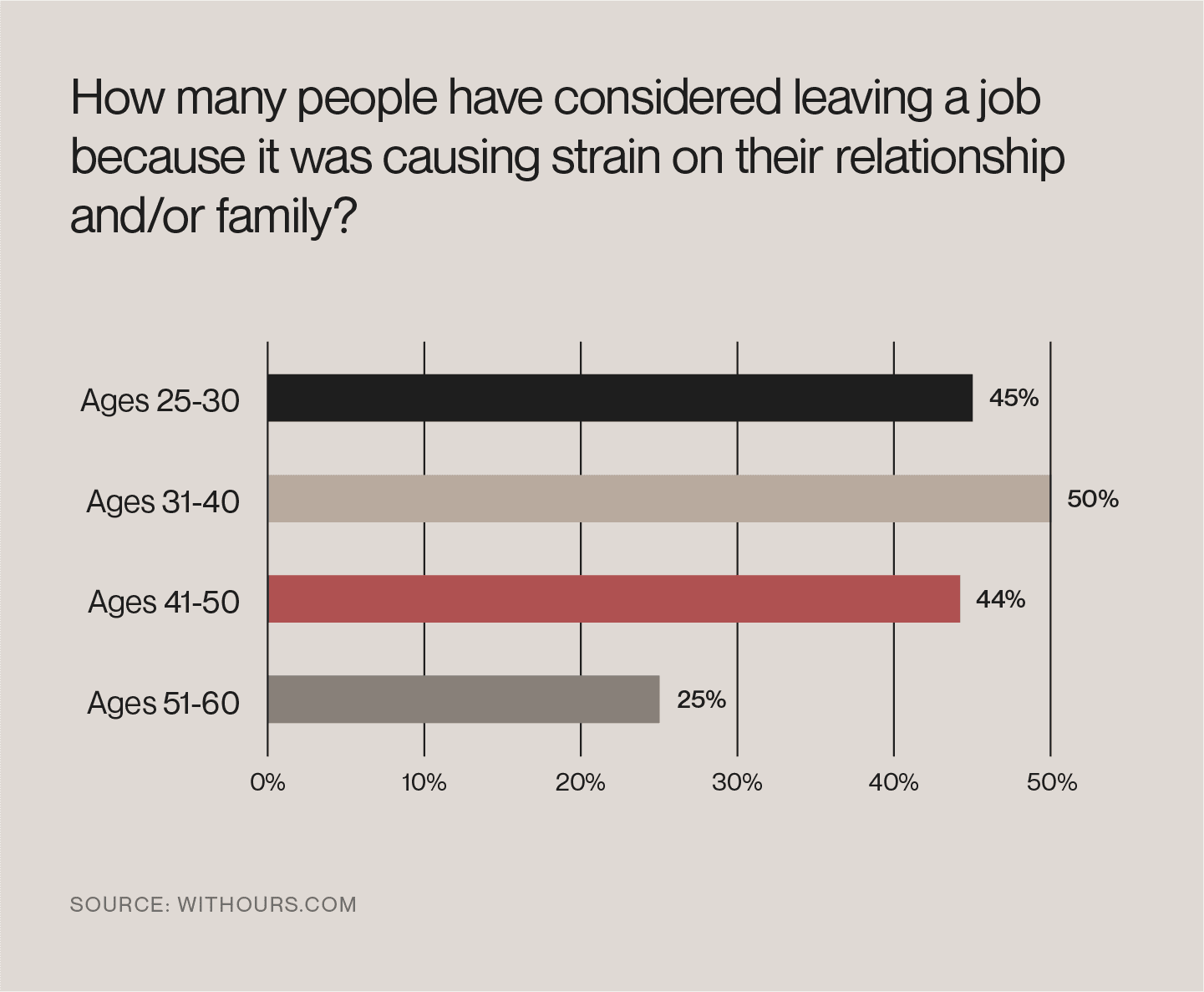
This corresponds to a larger trend among Gen Z and Millennials, who aren’t willing to sacrifice their well-being to succeed at work. According to a 2023 Deloitte survey, Gen Z and Millennials look for creative solutions such as flexible work hours and four-day work weeks to achieve a better work-life balance, which, for many, may allow them to prioritize relationships.
50% of single people say their job has made it difficult to find a partner
Single people also struggle to balance work and relationships. Nearly half report that their commitment to their job interferes with their ability to find a partner.
“As individuals increasingly prioritize themselves, many naturally invest significant time and energy in their careers,” Lahiry says. “They might view their work as a meaningful pursuit and it serves as a tangible measure of progress. However, this can inadvertently create challenges in finding a partner for those who seek an intimate relationship as one of their life goals.”
Half of single people report that their job makes it more difficult for them to find time in their schedule for dating. This may be because 59% of single people feel their employer expects them to work more than their coworkers with committed partners.
For example, a principal may ask a high school teacher without a significant other to chaperone a school dance or serve as a club advisor or sports coach rather than a teacher with a family.
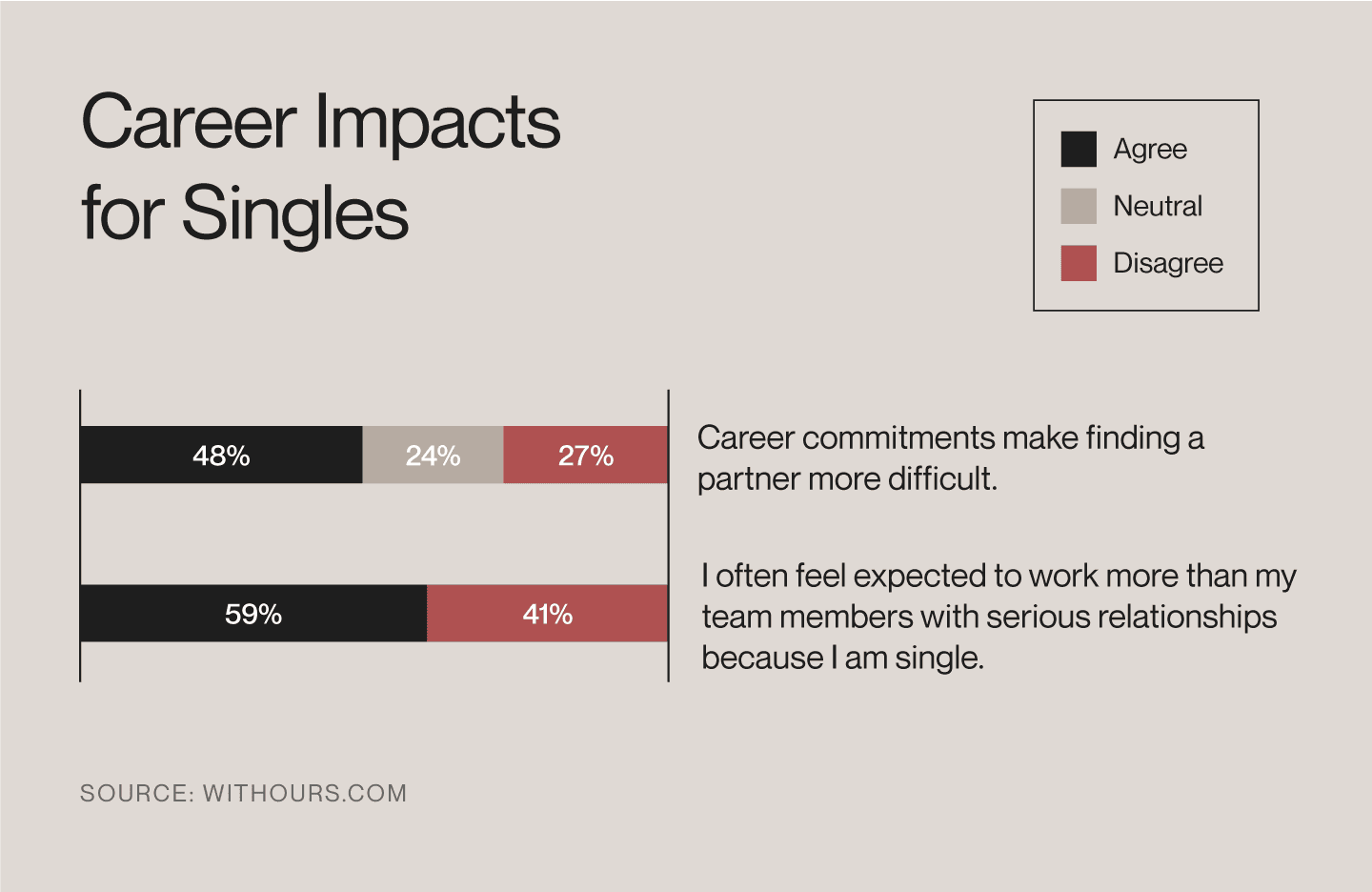
This suggests that employers must be careful when supporting their employees in balancing work and their relationships. Just because someone doesn’t have a committed relationship doesn’t mean they should be expected to do more work than their coworkers in a relationship. Everyone deserves a strong work-life balance.
32% of divorced people believe work played a role in their divorce
Nearly 100 of our respondents were divorced, and 32% of them identified their career or their partner’s career as playing a role in the divorce. Only a third of divorced respondents participated in some form of couples counseling to resolve the conflict before the divorce.
This sobering statistic highlights the consequences of not maintaining a healthy balance between work and your relationship. What may seem like minor inconveniences when you cancel dinner plans to wrap up a project or time spent apart for business travel can add up over time and destroy a relationship if you aren’t careful.
5 tips for balancing work and relationships
Career responsibilities often impact relationships, but you can protect your relationship with these five tips.
1. Set boundaries (and stick to them)
Establish boundaries at work. Consider setting limits on how long you’ll work each day or how many tasks you’ll complete. When you’ve reached the limit, leave work at work. Setting boundaries doesn’t work if you stop physically working but you’re thinking about work while you’re home.
Establishing boundaries isn’t enough — you have to stick to them. If you say you’ll only work 8 hours a day, stop working when your time is up. It’s okay if situations pop up that you can’t control, but be mindful of how often you break your boundaries.
2. Ask for help
Balancing work and relationships is hard, but you don’t have to do it alone. Delegate tasks at work and ask for advice from coworkers who have a healthy work-life balance. Find ways to accomplish more throughout the day, such as implementing a to-do list to keep you on track or block focused work time off on your calendar.
At home, ask your partner for help with tasks like cleaning, laundry, or cooking, or outsource them to a professional. When you need a break, reach out to relatives and friends for a helping hand or support such as childcare.
Don’t forget about the professionals. Attending couples counseling with a licensed therapist can help you and your partner work through your specific situation in a healthy and productive way.
3. Communicate
Healthy relationships are built on solid communication. Check in with your partner frequently about how they’re feeling, and be open about your feelings. Be upfront about potential work problems or schedule changes so your partner doesn’t feel blindsided if you need to work late. Let work know when you have commitments at home. If you don’t communicate, no one knows you need support.
4. Make decisions together
When we get overwhelmed at work, it’s not uncommon for us to go into survival mode, which may include making decisions quickly without consulting anyone. Even if you believe you know what your partner would decide, take the time to talk to them.
This is especially true before making any new work commitments. While a promotion that comes with a raise may sound great to you, your partner may be concerned about how the increased hours will impact family responsibilities.
5. Prioritize quality time
When you aren’t at work, prioritize spending quality time with your partner. While it might be tempting to spend your weekends catching up on household tasks, you need to take time to have fun with your partner. The dusting can wait while you and your partner go to dinner and a movie.
Learn how to balance work and family through couples therapy
Navigating a successful work-relationship balance is a challenge, and many couples can’t tackle it alone. Marriage counseling and other types of couples therapy can give couples the tools they need to resolve conflicts, make compromises, and find a balance between their careers and relationships.
Whether you want to build a strong foundation in a new relationship or you’re looking to restore intimacy in your marriage, the credentialed therapists at Ours can help. Sign up today to find the best therapist for your needs and start the journey to a better relationship.
Methodology
Participants were sourced through Cint (see more details in the ‘About Cint’ section). Participants were ages 25-60, from the United States, and self-identified as being employed.
Total survey respondents totaled 1,000. The survey was fielded and completed in February 2023. Of the 1,000 respondents, 500 of respondents identified as female, 493 identified as male, and 7 identified as third gender/nonbinary.
Of the respondents, 60% identified as being in a couple, 9% identified as divorced, and 30% identified as being single. 86% identified as heterosexual.
About Cint
The panels that are integrated into the Cint platform/make up the Cint sample ecosystem are carefully selected and vetted supplemental permission-based sample sources. Those panel partners source participants/panelists through a variety of methods in order to help build diverse, representative, engaged panel communities. Over time, each panel builds more and more detailed profiling points on each individual, and the Cint platform uses this deep information to facilitate matching the right active, engaged participants/panelists with the right surveys.
Some of the recruitment methods used by panel partners include: Online recruitment through the owner’s portal, which includes: (1) brand communities and (2) digital media and publisher sources; email recruitment through a panel owner’s newsletters; specific invitations sent to a panel owner’s database; email recruitment using a permission-based database; social networks; loyalty websites; affiliate traffic; telephone-based recruitment; and face-to-face (F2F) based recruitment.
All participants/panelists available through the Cint platform are subjected to comprehensive quality checks to ensure clients get the highest quality outcomes.
About Arch Insights
Arch Insights, LLC. is a consumer insights firm focused on providing clients with more efficient and effective consumer insights. Research protocols are built from years of experience in consumer insights, brand building, consulting, and industry research. Founder’s experience includes Bain & Company, Harry’s Inc., Torch Capital, and Harvard Business School. For more information, visit archinsights.com.








